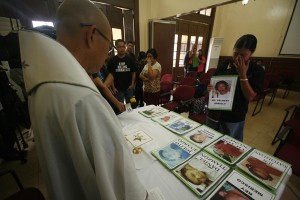Thirteen families of Maguindanao massacre victims on Friday filed a case before the Office of the United Nations High Commissioner for Human Rights against the Philippine government.
The complaint was filed electronically on Friday at University of the Philippines College of Law in Diliman, Quezon City, on the fourth anniversary of the murder of 58 people, 35 of whom were journalists, in Ampatuan, Maguindanao.
The killings have been described as the worst-ever attack on members of media.
Filing the petition in behalf of the victims’ families were lawyers Harry Roque Jr., Romel Baganes, Gilbert Andres, Ethel Avisado and Geepee Gonzales.
Roque said the petitioners brought their complaint to an international court because the government has failed to provide an effective resolution to the case and compensation for the families of the victims.
“It has been four years and no clear result was accomplished,” he said.
Baganes said the government violated Article Six of the International Covenant on Civil and Political Rights (ICCPR), which assures a citizen’s right to life and protection from the law.
The petitioners demanded a definitive court decision, administrative and judicial sanctions against those responsible for the massacre.
Only 148 of 500 witnesses in the case have so been presented, Roque said. “The process was slow because the court focuses on the 64 bail petitions for the accused.”
Of the 194 accused, 106 have been arrested, Roque added.
Gilbert Andres, a lawyer from Media Defense of Southeast Asia, said another petition will be filed with the UN Special Rapporteur of Freedom of Expression, Extra Judicial Killings and Reparation.
“Media killings are always re-occurring in the country which violates human rights and freedom of expression. The slow process of justice is another form of human rights violence,” Andres said.
Roque said the government is not clear on the compensation that the petitioners are demanding. “We talked to Deputy Presidential spokesperson [Abigail] Valte and she said the government has no money to compensate the families’ victims,” Roque said.
Center for Media Freedom and Responsibility Deputy Director Luis Teodoro commended the petitioners. “The system can no longer respond effectively and the best way to do is ask UN intervention,” Teodoro said.
Teodoro said the number of media killings in Metro Manila increased during the Aquino Administration. “It is very alarming because back then the focus of media killings are in the provinces but now it is happening also in Metro Manila.”
Roque appealed to the government for reforms in the justice system and politics. “It has been four years and only 20 percent of the case was discussed. The defense has not yet started,” he said.
One of massacre victims’ family member Charmaine Lechonsito appealed for immediate action from the justice department on the case. “I hope that the decision will be given as soon as possible. It has been four years and still, there is no action from the government,” Lechonsito said.
The Confederation of Asean Journalists (CAJ) called on the government to extend financial help to the families of the massacre victims to dissuade them from accepting a settlement with the suspects.
In its “Manila Declaration,” representatives of various media organizations across Southeast Asia said they are supporting the call of the National Press Club of the Philippines (NPC) for the government “to render financial and other material assistance to the victims’ families” so they would not be “induced” to “settle” with the principal suspects, the Ampatuan clan of Maguindanao, “thereby denying the end of justice and further strengthen the ‘culture of impunity’ that has been the bane of any civilized society.”
The declaration was signed by journalist leaders from Indonesia, Thailand, Malaysia, Vietnam and the Philippines during the CAJ’s 17th General Assembly in Manila on Friday.
NPC President, Benny Antiporda was chosen on lead the CAJ for the next two years.
“We recognize that with the help of the Philippine government to the families of the victims, justice can be attained in the end and that in attaining this, it shall serve as an inspiration to everyone in the belief that in the end, to be right is worth fighting for,” the CAJ said.
The three-day gathering coincided with the fourth anniversary of the massacre, which has been described as the world’s “worst attack” against members of the press.
On Saturday, the NPC will lead a rally at the Chino Roces Bridge (formerly Mendiola) and hold a torch parade to remind President Benigno Aquino 3rd of his campaign pledge that justice for the massacre victims will be achieved before the end of his term.
The NPC said its expect some 1,000 participants to join the rally at Mendiola. Among those who have signified their support were the Kilusang Mayo Uno, Bagong Alyansang Makabayan, Burgos Media Center, Courage, the Pinoy Hotline Riders’ Club of Metro Manila and UNTV, whose entire television crew in Mindanao was among the victims.
In Malacañang, Presidential Communications Secretary Herminio Coloma Jr. affirmed their “solidarity with the families of those who lost their lives in the Maguindanao massacre,” stressing that the Aquino government is “determined to erase the stigma of the culture of impunity that led to this heinous crime.”
“The PNP [Philippine National Police] has been directed to intensify efforts to arrest some 88 suspects still at large. The DOJ is undertaking a continuing effort to strengthen its investigative and prosecutorial arms,” Coloma said.
“We join the advocates for institutional reforms including amendments to the Rules of Court that will hasten the delivery of justice. We will work with Congress to prioritize action on the enactment of the proposed whistleblower bill and amendments to strengthen the witness protection law,” he added.


